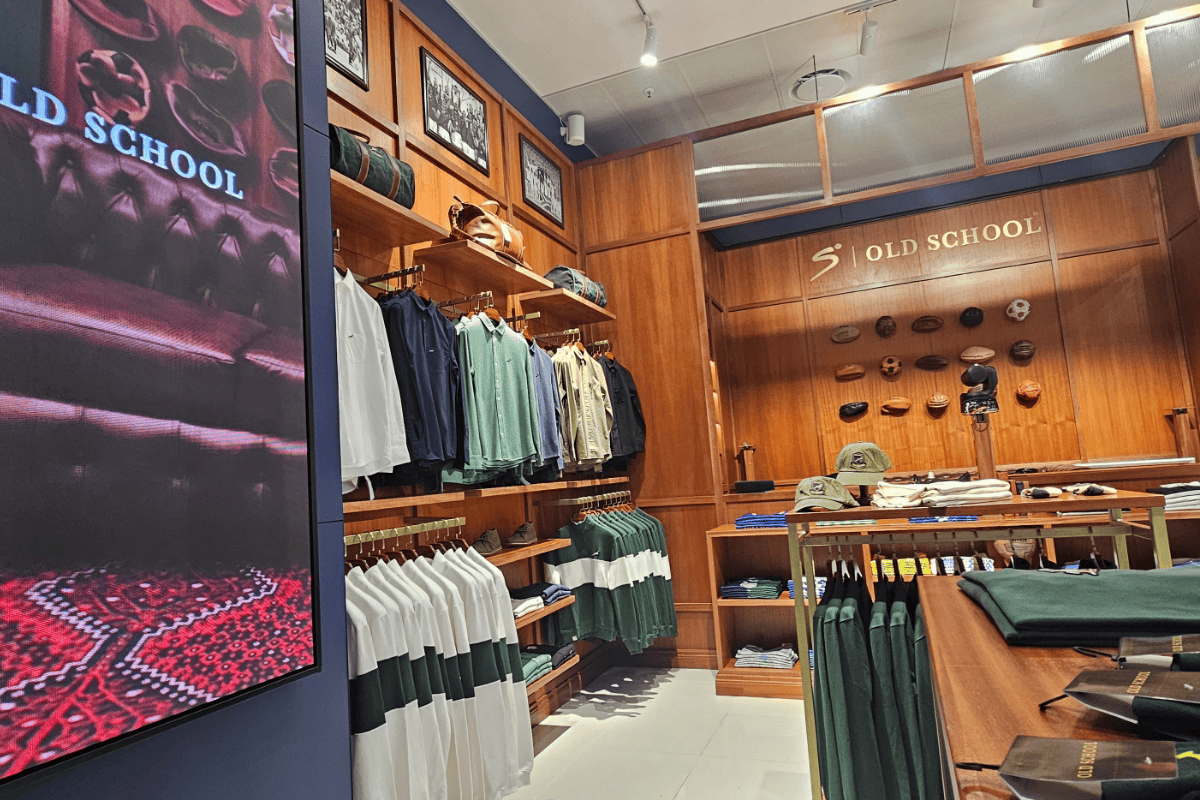Old School launched its 15th store at MultiChoice City and has now partnered with sports broadcaster SuperSport.

South African sports fandom has been rejuvenated in recent years thanks to the Boks’ success, Bafana Bafana’s revival, and the Proteas’ Test cricket winning streak.
This has been reflected in the increased number of fans at stadiums and the broad interest in the different sporting codes.
Fashion hasn’t been left behind, and the young brand Old School has been one of the leading brands which fans have embraced to show their support for their teams.
Old School was founded by brothers Daneel and Stephan Steinmann in 2019 in a dorm room in Stellenbosch, when they were searching for the perfect vintage South African rugby jersey.
One social media post later, and Daneel and Stef had captured the interest of thousands of potential customers. The brothers quickly set to work, and the business Old School brand was born.
Today, the brand makes more than Bok jerseys; it has now collaborated with big sporting brands like Orlando Pirates and Kaizer Chiefs, and is preparing to launch English Premier League kits.
ALSO READ: ‘It was always the ultimate goal’: Itumeleng Banda on joining SuperSport
SuperSport collaboration
Last week, Old School launched its 15th store at MultiChoice City and has now partnered with sports broadcaster SuperSport.
“If you look at the SuperSport brand and the guys we work with, like Chiefs, Pirates, the Springboks, Dricus and any team you know….SuperSport is the one consistent in the last 30 years,” Old School co-founder, Daneel Steinmann.
The partnership will see some SuperSport presenters and pundits wearing Old School apparel, while their store at MultiChoice City features a recording facility for SuperSport presenters to host podcasts.
Steinmann said he knew they could add something to the sports broadcaster because the channel is solely focused on broadcasting.
“But they also needed to start telling stories more on an Instagram, TikTok level…and we know that their talent, their ambassadors are our ambassadors.”
“Our biggest weakness is the lack of credibility, the newness of us…they’ve got the known factor, the stability, legacy,” he shared.
“We don’t wanna sell merch, we wanna tell stories. People buy our merch because they associate with the way we are bringing culture and content into merchandise, not just putting it on shelves.”
Fan appreciation
Despite the Old School price tag, soccer fans have embraced the brand so much that when they launched a pop–up store in Durban during the Nedbank Cup final earlier this year, the Kaizer Chiefs and Orlando Pirates merchandise sold out, and they had to fly in more from Joburg.
“It says to me that the brands mean a lot to them [fans], and I think they care about good product. Like, they want to wear a product that they can wear post-season. I think we’ve realised that they would rather pay more for good quality than get something that people think they can afford.”
Since coming on the scene, the brand has been pitted against Kasi Flavour, which is owned by the son of the late legendary footballer Isaac ‘Shakes’ Kungwane, Kabelo Kungwane.
“I think what they’re doing is awesome,” Steinmann says of Kasi Flavour.
Kasi Flavour was founded around 2015.
The term ‘Kasi Flavour’ is believed to have been coined by Shakes during his time as an analyst on SABC Sport to describe the football style found in townships across the country.
“Just like a lot of people would say ‘somebody copied this or copied that’, but I think when you go look at the world of fashion, everyone takes inspiration from the same generation.
“We’re both taking inspiration from Bafana Bafana [in the] 1990s. It’s not us taking their [Kasi Flavour] inspiration. I think there’s a place for more than one person…it’s awesome that there’s variety. At the end of the day, the fan must choose,” says Steinmann.
Steinmann shares that supporting them is supporting their favourite teams, because their deals with the likes of Pirates and Chiefs mean the teams get a share of each sale.
NOW READ: Anything Goes on a decade of growth in Mzansi’s festival landscape






